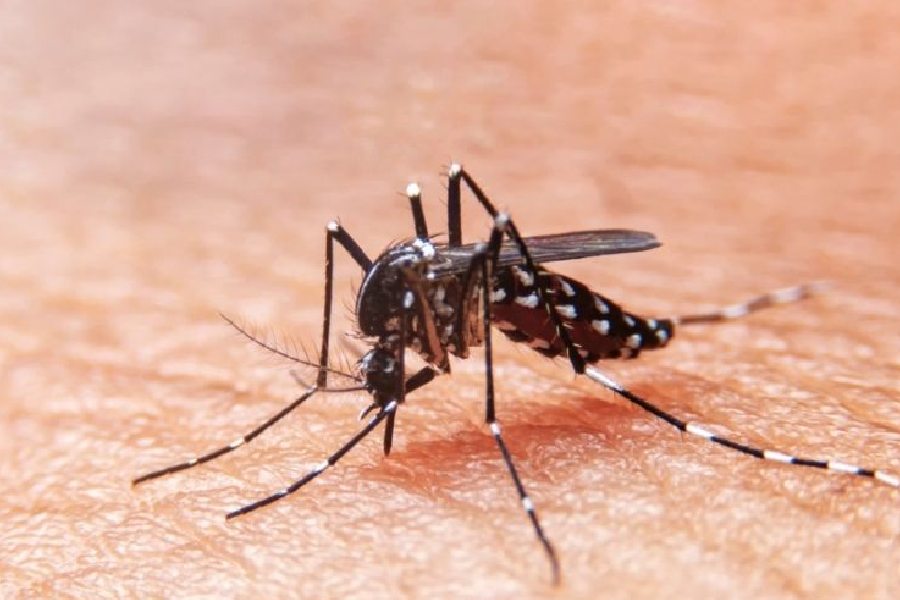The government is focussing on cleanliness and timely tests to prevent the spread of dengue, a senior health department official quoted Bengal chief secretary H.K. Dwivedi as saying at a meeting called to discuss ways to tackle the mosquito-borne disease.
Thursday’s meeting, which was called following an instruction from chief minister Mamata Banerjee, decided to intensify house-to-house visits in both urban and rural areas.
The senior health department official, who attended the meeting, said that since dengue cases are rising, strict measures should be taken by all departments.
A state government official said that since January, more than 3,000 dengue cases have been detected across Bengal.
Several deaths due to dengue have been reported in the city in the past few days and the number of infections has been rising.
Cleanliness week
“In today’s meeting, it has been decided that cleanliness week will be observed twice monthly from August 2023, onwards. Proper cleanliness drives, including collection of discarded materials, will be taken up in urban and peri-urban areas,” a statement issued by the state government said.
Central government institutions like the railways, port and army, and industrial units will be requested to undertake “proper” cleaning drives in their areas.
Officials from various government departments will be deployed for the prevention of dengue, especially for the monitoring and supervision in rural areas, the meeting decided.
According to a public health expert, cleanliness is the key to preventing the spread of dengue.
“If we cannot reduce the breeding grounds of the Aedes aegypti mosquito, which spreads the dengue virus, more people will fall ill and there will be a huge pressure on the healthcare infrastructure. Then there is shortage of platelet (critical dengue patients may need platelet transfusion),” the official said.
“Cleanliness can prevent such a crisis. Also, it is not just the government’s responsibility. Individuals, too, need to keep their houses and surroundings clean,” he said.
The Aedes mosquito can lay eggs even in a teaspoon of freshwater. It takes around a week since eggs are laid for adult mosquitoes to emerge. So public health experts urge people to drain out accumulated water at least once a week.
The Telegraph reported earlier this week that garbage was lying scattered across multiple pockets in Kolkata. Such garbage can turn into breeding sites for mosquitoes, especially during the monsoon.
“ASHA workers and other field level staff have been sensitised on dengue prevention,” the statement said. “Pulse mode cleaning activity including surveillance with the help of drones has been taken up in all municipalities to control mosquito breeding sites.”
Vector-control activities started this month in all 129 urban local bodies and will continue till December.
In addition, 624 rapid response teams have been kept ready at urban local bodies to destroy mosquito larvae.
A total of 1,32,220 workers have been deployed across the state for vector-control activities. Adequate quantities of larvicide have been supplied to all districts, the statement said. Around 1,500km canals have been brought under annual maintenance contract for periodic cleaning.
Testing
The state government has decided that community health workers will ensure that everyone suffering from fever for more than two days get tested for dengue.
According to a doctor, an NS1 antigen test is usually done to detect dengue early in the course of the disease.
“Although theoretically dengue NS1 antigen test comes positive between day 1 and 5, the chances of false negative are more in the first 24 hours. So by testing after two days, the chances of missing a diagnosis are much less,” said Chandramouli Bhattacharya, infectious disease expert at Peerless Hospital. He said complications from dengue are rare early in the course of the disease. All complications tend to occur from day 4 or 5.
According to a state government official, 160 government facilities across the state conduct the dengue test for free. “Around 9,000 doctors and para-medical staff have been trained in case management of dengue patients,” he said.
Dedicated round-the-clock fever clinics have been started at hospitals with high case load.
Dengue observer teams will start visiting high case-load hospitals for supportive supervision, according to the official.
All hospitals have been kept ready for any surge in admission of dengue patients.
